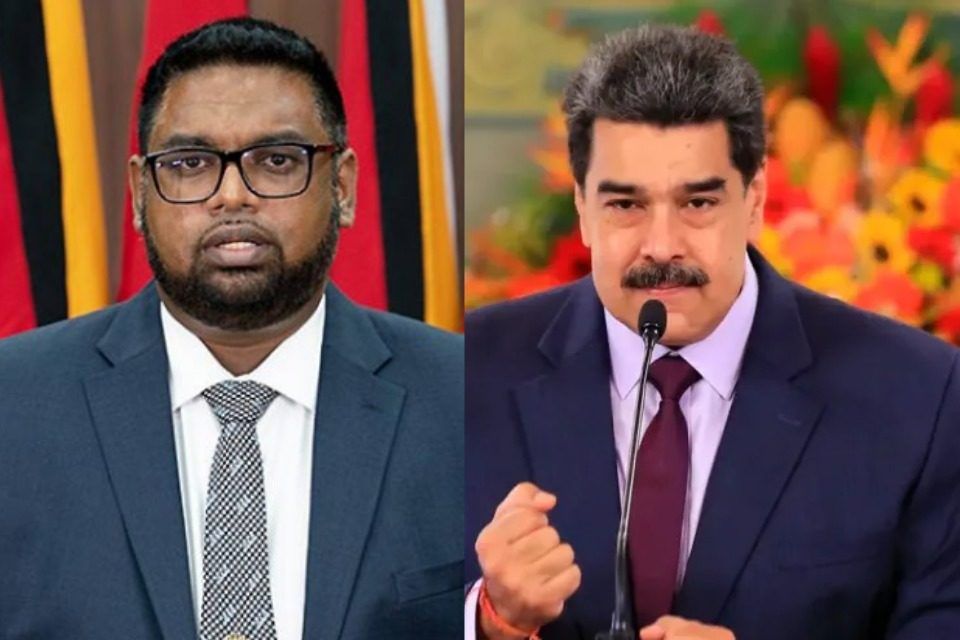Amid the swingeing tensions sparked by Venezuelan aggression, President Irfaan Ali is expected to meet with Venezuela’s President Nicolas Maduro in a meeting that will be brokered by the Prime Minister of St Vincent and the Grenadines, Ralph Gonsalves.
Minister of Foreign Affairs Hugh Todd told Stabroek News today that the agreement by Guyana for the meeting was given during CARICOM’s emergency caucus last evening.
Venezuela’s Foreign Ministry first made the announcement today.
“The President of the Bolivarian Republic of Venezuela, Nicolas Maduro Moros, has held telephone conversations with President Luiz Inácio da Silva and with the Prime Minister of Saint Vincent and the Grenadines, Ralph Gonsalves. In these talks, the proposal was given to hold a high-level meeting with the Cooperative Republic of Guyana, which will be announced in the coming days, in order to preserve our aspiration to maintain Latin America and the Caribbean as a zone of peace, without interference from external actors, as agreed by both countries within the Community of Latin American and Caribbean States (CELAC). Venezuela expresses its satisfaction and assumes this call with pleasure and commitment,” the statement said.
“The Prime Minister of St. Vincent and the Grenadines, Ralph Gonsalves, will meet with Nicolas Maduro in Venezuela on Saturday to discuss the border issue with Guyana,” it added.
The St. Vincent Times today reported that Gonsalves yesterday told a press conference he was going to Venezuela. “I won’t answer your question about going to Venezuela to discuss this. I’ll just tell you that I am going to Venezuela,” he said, adding that the Georgetown-Caracas border row “is one that bothers me deeply.”
“I just want to see the principles of international law followed, that there be peace and no use or threat of force in this particular controversy,” he had added.
He said that “As Guyana pursues its case before the International Court of Justice, I am hopeful that both sides will still have a conversation, if not on the border controversy, but on other matters, including respect for international law, the principles of international law, and no force or threat of force,” Gonsalves said, noting that both countries are neighbours.”
The Office of the President has since issued the following release:
December 9, 2023
The President of Guyana, His Excellency Mohamed Irfaan Ali was contacted by leaders representing CELAC, Brazil and several bilateral partners, encouraging dialogue with the President of the Bolivarian Republic of Venezuela. Last evening, in the emergency meeting of the Heads of Government of CARICOM, the Heads urged President Ali to explore the possibility of a meeting with President Maduro in St. Vincent and the Grenadines.
President Ali reiterated that Guyana’s land boundary is not up for discussion, as it is currently before the ICJ and when adjudicated will be fully respected by Guyana. The President on numerous occasions has made it explicitly clear that the case before the ICJ will not be an issue for bilateral discussions.
President Ali will continue to engage our bilateral partners on defence cooperation pacts, as well as the on-going range of political, social and economic arrangements.
President Ali was approached today by the Prime Minister of St. Vincent and the Grenadines on a meeting with President Maduro on Thursday in St. Vincent & the Grenadines to be observed by Brazil, CARICOM, and a UN Under-Secretary General. President Ali has since agreed to have this meeting.
Guyana is clear that the advancement of our development agenda will not be compromised. Our development partners and investors can be assured that there will be no changes nor alterations to existing arrangements.
Guyana has always been committed to international peace and security and promotion of good neighbourly relations.
Further, Guyana will not deviate from and will strictly adhere to the ICJ process in the resolution of the border controversy, and to ensuring that the region remains Zone of Peace.

